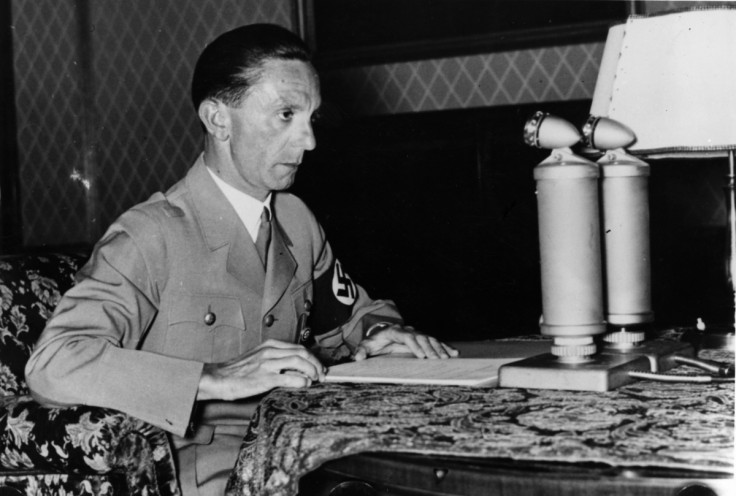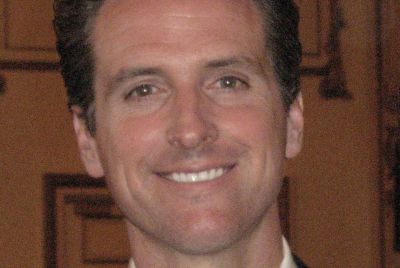These Joseph Goebbels quotes sound a lot like Donald Trump's media strategy
Alternative facts, truthful hyperbole - how Donald Trump handles the media sounds worryingly familiar.
At 106-years-old, Brunhilde Pomsel, war-time secretary to Nazi Germany's notorious chief propagandist Joseph Goebbels, has died.
She only spoke late on in her life about her role working for Goebbels, which she secured because of her skill as a typist. But she said she did not share in the blame for the Holocaust, in which six million Jews were murdered by the Nazis.
"I wouldn't see myself as being guilty," Pomsel said during a documentary called A German Life. "Unless you end up blaming the entire German population for ultimately enabling that government to take control. That was all of us, including me."
Goebbels, who Pomsel called "arrogant", was an appalling man who killed himself in the final days of the war as the Allies march on Berlin, and therefore could not be brought to justice for his Nazi crimes.
But he was also a very smart man who understood the huge power of propaganda and how it could be deployed with chilling effect. Even today, over 70 years after his death, we can see his theories resonating in political propaganda.
Most politicians and governments deploy spin and rhetoric to some degree. But there are troubling echoes of Goebbels in Donald Trump's campaign for the White House and early presidency. In particular, Goebbels's understanding of how effective propaganda could be if it is used aggressively and without scruples.
Here is how Goebbels's theories in his own words can be seen deployed in practice by today's Trump presidency, whether or not the administration realises the similarities in its tactics.

It would not be impossible to prove with sufficient repetition and a psychological understanding of the people concerned that a square is in fact a circle. They are mere words, and words can be molded until they clothe ideas and disguise.
Trump's spokesman Sean Spicer was sent out during the administration's first press conference to berate the media for its coverage of inauguration crowds. During that press conference, Spicer called it "the largest audience ever to witness an inauguration, period, both in person and around the globe", for which there is no evidence, and images from the day suggest otherwise.
He made a number of other misleading assertions about the size of the inauguration crowd, based on a faulty comparison with Obama's second inauguration, using the number of travellers on the Metro. Later, he peddled Trump's unevidenced claim that millions of people voted illegally in the election.
Trump himself falsely claimed to have saved and created thousands of American jobs since he won the election. In one example, he claimed credit for the creation of 5,000 jobs by Sprint, even though they had been announced before the election.
The Trump team know that there is enough doubt and mistrust of the media that they can put out their own "alternative facts", as top Trump adviser Kellyanne Conway put it, and many people will believe them over journalists. This is a postmodern view of facts — that there is no objective truth, but many 'truths'. It's a question of who the audience trusts more.
Plus, this is a test of loyalty for those who back Trump or work for him. Do they support him enough – is his power over them sufficiently strong – to sacrifice their own integrity by propagating and defending his untruths and distortions?
The most brilliant propagandist technique will yield no success unless one fundamental principle is borne in mind constantly - it must confine itself to a few points and repeat them over and over.
Trump's campaign was very effective at pushing slogans that reflected its most important values and ideals. Think: Build The Wall, America First, Lock Her Up, Low-Energy Jeb, Muslim Ban. These were simple, often-repeated messages that defined the narrative around Trump and his rivals.
Propaganda should be popular, not intellectually pleasing. It is not the task of propaganda to discover intellectual truths.
Trump is characterised by his populist flair. Demagoguery, in other words. What is important to him is the power of emotion. He and his team are very good at grabbing people by their heart and gut, as shown by his rapturous supporter rallies around the countries. He speaks to many Americans directly about their fears and concerns – adopting and amplifying them – and gives them the simple solutions they want to hear. The difficult practical realities of policymaking, which must be navigated by any responsible government, appear largely unimportant to him.
The president's attitude is probably best summed up in a now infamous quote from his ghostwritten book, The Art of the Deal: "I play to people's fantasies...People want to believe that something is the biggest and the greatest and the most spectacular. I call it truthful hyperbole. It's an innocent form of exaggeration — and it's a very effective form of promotion."
Think of the press as a great keyboard on which the government can play.
Trump and his team's attitude towards the media is hostile. And it's fair to say the feeling is largely mutual. But Team Trump's belief is that the media should be much more sympathetic to his presidency, and they have given what sounds like threats to journalists who don't soften their tone about the administration.
Sean Spicer said the government would "hold the press accountable" when talking about the inauguration crowd debacle. Trump, who describes himself as in "a running war" with the media, refused to take a question from a CNN journalist during a press conference, saying "you are fake news". Steve Bannon, Trump's chief strategist, told the New York Times the media "should be embarrassed and humiliated and keep its mouth shut and just listen for a while...The media here is the opposition party."
Source for Goebbels quotes: Goodreads
© Copyright IBTimes 2025. All rights reserved.





















